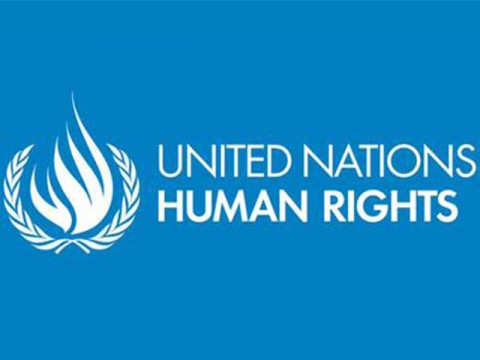The State Council Information Office this week released the “National Human Rights Action Plan of China (2016-2020),” China’s third such plan on the protection of human rights. This year’s white paper comes on the heels of the harshest jail sentence yet delivered amid what exiled rights lawyer Teng Biao recently described as the “worst human rights crackdown [in China] since the Tiananmen massacre of 1989.” At Reuters, Ben Blanchard reports on the Chinese government’s pledge to cooperate with the United Nations Human Rights Council, putting that promise into the context of Xi’s ongoing crackdown and Beijing’s long-strained relationship with the UN rights body:
China frequently faces censure at the U.N. rights body, and has refused to allow in some U.N.-appointed envoys. Others have complained that when they are allowed to visit the government interferes with their work and blocks access to interviewees.
China’s latest National Human Rights Action Plan, which runs to 2020, promises that China “will cooperate with the Special Procedures of the United Nations Human Rights Council”.
[…] China frequently says that it does not believe the issue of human rights should be politicized, and has for example rejected efforts by the United Nations to investigate alleged rights abuses in reclusive North Korea, which has close ties with China.
[…] China routinely rejects foreign criticism of its rights record, and says that guaranteeing things like the right to education and freedom from hunger, where it has been very successful, show its commitment to a more broader definition of human rights. [Source]
Reuters last year reported on Chinese government representatives using intimidation tactics to silence critics at the UNHRC in Geneva (via CDT). Earlier this year, United Nations Secretary General Ban Ki-moon expressed his “disappointment” with a China-backed rejection of the Committee to Protect Journalists’ application for U.N. consultative status. More recently, in August a U.N. special rapporteur on human rights accused authorities of obstructing his investigations in China.
To read all of the UNHRC relevant statements in the new paper, see section V, titled “Fulfillment of Obligations to Human Rights Conventions, and International Exchanges and Cooperation in the Field of Human Rights,” via Xinhua. The language in this version is very similar to that found in earlier action plans. See also English-language state media coverage of the paper which emphasizes the plan to “boost” international exchanges, or its promise to promote rights training and education. State media also reported this week on a seminar being held in Chongqing focused on ethnic minority rights, where according to the report many European experts are in attendance.
The white paper and state media emphasis on Beijing’s continuing cooperation in international rights protection efforts seem to contradict Beijing’s long-running efforts to contest the universality of human rights as a Western construct. Recently, the most prominent campaign in Xi’s broader crackdown on human rights has focused on lawyers and activists, five of whom have been sentenced in recent weeks. The first four, detained in last year’s “Black Friday” crackdown, all pled guilty and declined to appeal, receiving between a three-year suspended and a 7.5 year prison sentence. They also saw their courtroom statements feature in a propaganda campaign blaming their activism and legal advocacy on “foreign hostile forces” intent on training them in order to destabilize China. (Others detained in the Black Friday campaign were reportedly released on bail after making confession-like statements which also alleged foreign training, though there is remaining doubt that they were truly released.) The fifth, rights lawyer Xia Lin, detained in 2014, refused to admit guilt and vowed an appeal. He was sentenced to 12 years in jail, the harshest verdict yet in Xi’s crackdown.
As mentioned in the Reuters article quoted above, China is known to reject foreign criticism of its rights record, and the SCIO paper above is the latest of many regularly published white papers heralding progress on the rights front. Earlier this month, amid a chorus of criticism of the crackdown on rights lawyers and an unfairly arranged judiciary, the State Council released a white paper praising the “new progress made in human rights protection in the field of justice.” At the Mercator Institute for China Studies’ MERICS Blog, George C. Chen last week described the white paper on judicial rights protection as a “jumble of selective statistics and unsubstantiated claims”:
The paper claims to have improved citizens’ access to justice: several documents issued by China’s judicial authorities all enshrine lawyers’ rights to practise. This may sound good on paper, but is hardly reassuring to China’s human rights lawyers who have been harassed and detained by authorities in a sustained and relentless crackdown throughout the past year. In contrast, the UN has made repeated appeals for China to improve the treatment of lawyers and human rights activists. A recent report from the UN Human Rights Council still contains a variety of allegations against China in this respect.
[…] According to the paper, the procuratorial organs dealt with 31,874 cases of abusive illegal conduct such as compulsory measures and unlawfully obtained evidence in 2015. The paper also proclaims to supervise detention facilities to prevent them from “extorting confession by torture”. Yet, the situation of crime suspects and detainees in China has worsened in the recent past. The public confessions of prominent human rights lawyers this year, broadcast on television or published as newspaper interviews, are unprecedented and contravene the fundamental principle of rule of law.
If China really wanted to reform its judicial system, it would be better off relying on outside assessments and advice than on its White Paper. In 2005, the UN Special Rapporteur on Torture submitted a report to the UN after a visit to China, in which he made several recommendations for eliminating injustice in China’s judicial system. […] [Source]








